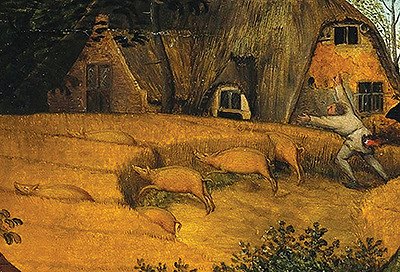
Museum archives: Justice for the Common Man
In the Middle Ages there was a system of justice called ‘Wager of Law’. A defendant, in a court of law, could establish his innocence or non liability by taking an oath and by getting a number of his neighbours to swear that they believed in his oath. It was essentially a character reference. Often twelve men could be required to swear but for lesser cases a smaller number would suffice.These men (always men) were sometimes known as ‘oath-helpers’ and the system could be referred to as ‘compurgation’. It was a way to give credibility to the oath of a defendant at a time when a person’s oath carried more weight than a written record and when members of a small community knew pretty well all that was happening in their parish or manor.
It was the system of justice used when two Wiston neighbours fell out in the in the decade following the Black Death.
In 1357 Richard Sexteyn complained that ‘on certain days and places John Skypard and Isabella his wife, with their pigs, ate down 2 acres of peas of the said Richard. And that the said John and Isabella did other damage to the said Richard in beating Alice his wife, against the peace, to the damage of 20 shillings.
Afterwards come the said John and Isabella and say that they are not guilty as is charged upon them and thereon they will wage their law. And he [John Skypard] has a day for his law with a 4th hand at the next court.’‘With a 4th hand’ meant that John had to find three people to swear to the truth of his denial in addition to himself – 4 in total. John and Isabella then counter-claimed. They said not only that it was Richard and not he who was guilty of trespass but ‘that Alice, the said wife of Richard Sexteyn, on a certain day and place beat and wounded the wife of the said John Skypard to the damage of the said John and Isabella of 20 shillings’.
It must have been a quite a cat fight between the two wives.
The important claim, however, related to the matter of trespass. It came down to whether or not John could find three men to swear an oath in his support. First John would have had to make his oath. Then, one by one the others would be called to swear to their belief in the sincerity of John’s oath. If only one hesitated John would be found not to have proved his case. In this instance he was unsuccessful.
Either he could not persuade three neighbours to come or, if they came, one or more would not stand the test. So the record shows that ‘John Skypard and Isabella his wife have waged their law against Richard Sexteyn on a plea of trespass and have failed in law. . . Failure of Law : Fine 2 pence.’
In ‘the Sheriff’s tourn’ [a sort of circuit court] Richard also complained that John had ‘wickedly maligned him’, a complaint which a jury affirmed.
Yet another court record tells us more about John Skypard. He had very little going for him. ‘The Lord’s homage [the body of tenants attending a manorial court] say, on their oath, that John Skypard is poor, weak and lame because he had an injury in his left foot whereby he could not hold his land or do for the lord the rents and services pertaining to his bondland'.
'Afterwards comes the said John and surrenders into the lord’s hand the aforesaid land and gives to the lord for heriot [a tribute paid to the lord of the manor on the transfer of land] one pig which is valued by the homage at 18 pence’.
The life and hardships endured by John Skypard are laid bare by these court records in a way which allows us a rare insight into a medieval peasant’s world – and into his interaction with the system of justice.

